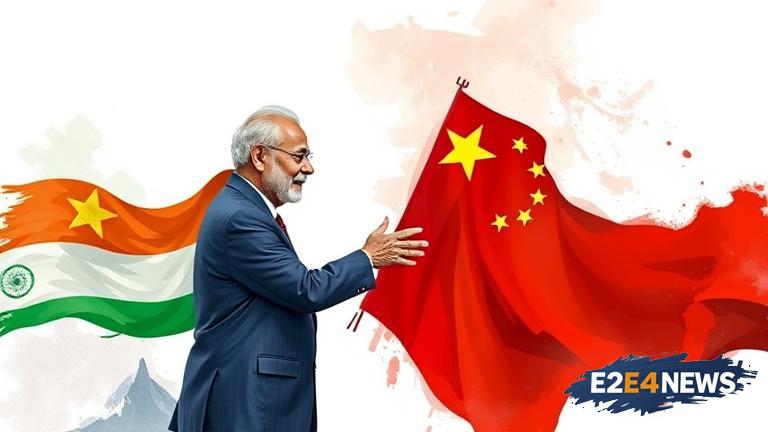The relationship between India and China has been complex and often tumultuous, with periods of cooperation and conflict. However, in recent times, there has been a noticeable shift in the dynamics of their ties. The two nations have been engaging in high-level diplomatic talks, with a focus on resolving long-standing issues and strengthening economic cooperation. This reset in India-China ties is seen as a positive development, with the potential to bring about greater stability and prosperity to the region. The Indian government has been actively pursuing a policy of engagement with China, with Prime Minister Narendra Modi meeting with Chinese President Xi Jinping on several occasions. The two leaders have discussed a range of issues, including trade, investment, and security. China has also been increasing its investment in India, with several major Chinese companies setting up operations in the country. The reset in India-China ties is also seen as a response to the changing global landscape, with the rise of the United States and the European Union as major economic powers. India and China are both seeking to strengthen their positions in the global economy, and cooperation between the two nations is seen as essential to achieving this goal. The two countries have also been cooperating on regional issues, such as the fight against terrorism and the promotion of economic development in South Asia. However, despite the positive developments, there are still several challenges that need to be addressed. The border dispute between India and China remains unresolved, and there are concerns about China’s growing military presence in the region. The Indian government has also been critical of China’s human rights record, particularly in the Xinjiang region. Nevertheless, the reset in India-China ties is a significant development, with the potential to bring about greater cooperation and understanding between the two nations. The Indian government has been seeking to diversify its economic ties, with a focus on reducing its dependence on Chinese imports. The country has also been seeking to strengthen its relationships with other nations in the region, including Japan and Australia. The reset in India-China ties is also seen as a response to the growing competition between the United States and China, with India seeking to maintain its independence and sovereignty in the face of great power rivalry. The Indian government has been critical of China’s Belt and Road Initiative, which is seen as a attempt to expand Chinese influence in the region. However, despite these challenges, the reset in India-China ties is a positive development, with the potential to bring about greater cooperation and understanding between the two nations. The two countries have a long history of cultural and economic exchange, and there is a strong desire to strengthen these ties. The Indian government has been seeking to promote people-to-people exchanges, with a focus on education, tourism, and cultural exchange. The reset in India-China ties is also seen as a opportunity to promote economic development in the region, with a focus on infrastructure development, trade, and investment. The two countries have been cooperating on several major projects, including the development of the Bangladesh-China-India-Myanmar Economic Corridor. The reset in India-China ties is a significant development, with the potential to bring about greater cooperation and understanding between the two nations. The Indian government has been seeking to promote a policy of engagement with China, with a focus on resolving long-standing issues and strengthening economic cooperation. The two countries have a long history of cooperation, and there is a strong desire to strengthen these ties. The reset in India-China ties is a positive development, with the potential to bring about greater stability and prosperity to the region.
